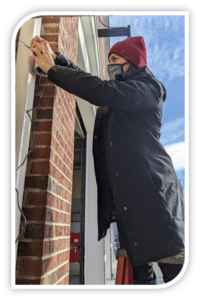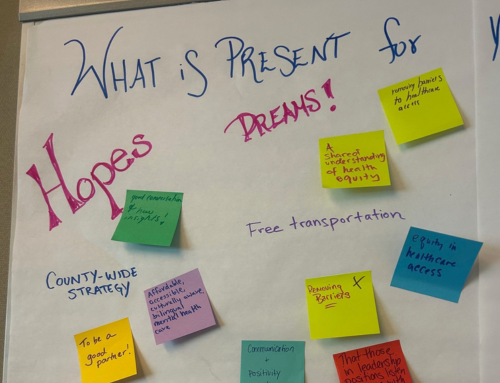Climate change is a threat to our planet and to the health and wellbeing of our communities. Two public health departments, Franklin County Public Health and Tacoma-Pierce County Public Health are tackling this issue based on what their counties are experiencing. While some of the health departments’ challenges may differ, both are working to create partnerships, engage communities, and implement strategies to address the effects of climate change.
Franklin County, like many areas around the world, is dealing with the consequences of climate change. Franklin County Sustainability Supervisor Jennie McAdams said the county has witnessed a surge in extreme heat, increased precipitation, and an increase in days with poor air quality. These changes not only threaten the environment but also pose significant public health risks. Franklin County has stepped up to the challenge in multiple ways. 
One of its primary partnerships involves the expansion of tree canopies. Planting native tree species provides shade, cools the environment, and enhances oxygen levels.
Everyone can play a role, whether small or large, in addressing climate change individually or as part of their community to make an impact. One small step she advises people to consider is switching from a gas lawn mower to an electric one. According to the U.S. Environmental Protection Agency (EPA), one hour operating a new gasoline lawn mower emits the same amount of volatile organic compounds and nitrogen oxide driving a new car 45 miles.
“Every effort adds up,” said McAdams. “My little yard is a part of the great ecosystem we’re all in.”
“Whatever seeps in the land can get into the water,” she added.
McAdams said it’s important to understand the state of public health and its inequities, one of those being urban heat islands. Urban heat islands are areas, mainly populated with Black, Brown and POC communities, that severely lack trees and usually have asphalt streets. Asphalt tends to take a long time to cool down and without the help of the trees’ shade, these areas experience an increase in heat.
“It’s pretty obvious we have a state of extreme weather,” said McAdams. “You might be fine…[but] that’s not the case around the world or country.”
She added that society needs to “start looking at [climate change] as you would any emerging threat.”
Tacoma-Pierce County also faces a unique set of climate challenges. Tacoma-Pierce County Justice Coordinator, Cindy Haverkamp, said the region experiences longer, drier summers, extreme cold winters, and an increasing amount of harmful algal blooms (HABs). These challenges threaten the environment, health, and wellbeing of the local population.
 Tacoma-Pierce County has taken an education and outreach approach. Recognizing the importance of reaching vulnerable populations, the county created infographics about extreme heat and air quality. The health department partnered with libraries and parks to distribute these resources. Along with the information, through a program, residents received free box fans and filters.
Tacoma-Pierce County has taken an education and outreach approach. Recognizing the importance of reaching vulnerable populations, the county created infographics about extreme heat and air quality. The health department partnered with libraries and parks to distribute these resources. Along with the information, through a program, residents received free box fans and filters.
Just like Franklin County, Tacoma-Pierce County prioritizes collaboration like its partnership with Tacoma Tree Foundation. Both organizations are working on policy and outreach to improve tree canopies, not just in their county but across the country. The goal is to increase tree canopy cover in the City of Tacoma from 20% to 30% which will require planting one million trees by 2050. Haverkamp says with limited land owned by the city, it may be difficult to plant a lot of trees without the help of the community.
Along with dry heat, Tacoma-Pierce County is battling HABs, which pose a threat to swimmers in popular lakes. Inhaling these toxins and polluting the air are concerns. While eradicating HABs is challenging due to their sporadic nature, the county focuses on boosting awareness. Their aim is to educate residents about the risks tied to HABs through informative communication.
“Because the health department is [focused on] outreach and education… partnerships are vital,” said Haverkamp. “It’s our responsibility to develop health guidance and find opportunities for outreach with the help of our community partners.”
Climate change is a complex challenge that requires a multi-faceted approach. Franklin County and Tacoma-Pierce County show the importance of education, outreach, and collaboration in confronting these issues head-on. By empowering individuals, communities, and organizations with knowledge and resources, these public health departments are fighting against climate change.
As climate change continues to shape our world, the lessons learned from Franklin and Tacoma-Pierce Counties can help other public health departments with their own county’s climate change issues.
“Even small steps move us towards a better future,” said Haverkamp.
“Every effort adds up. My little yard is a part of the great ecosystem we’re all in.”





